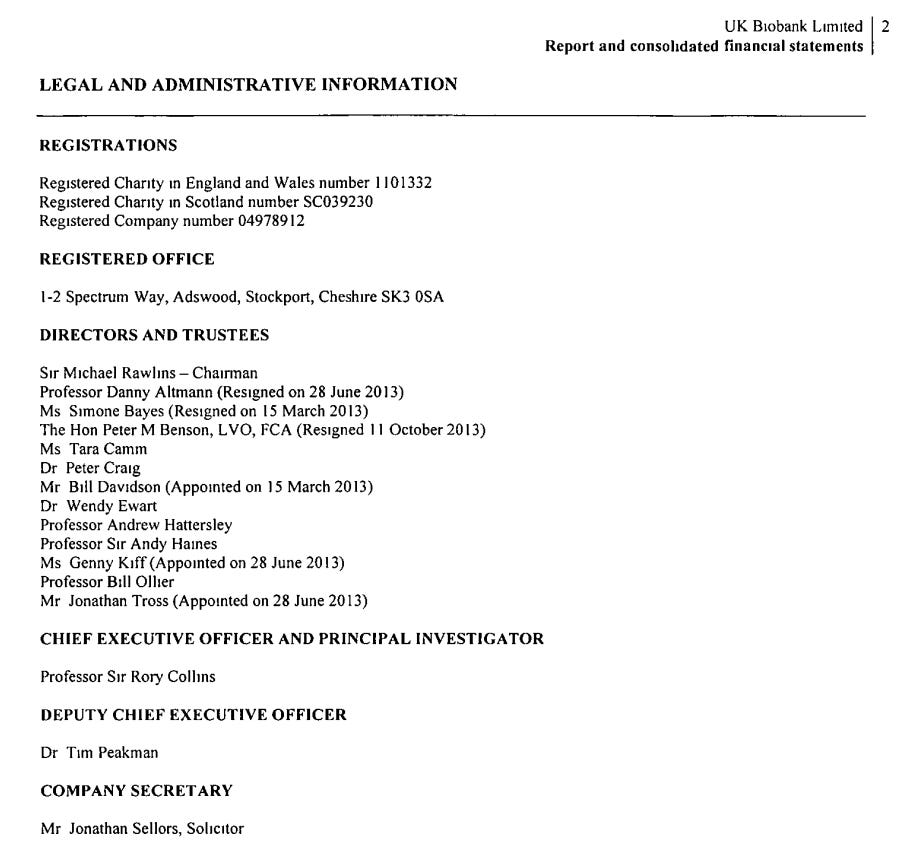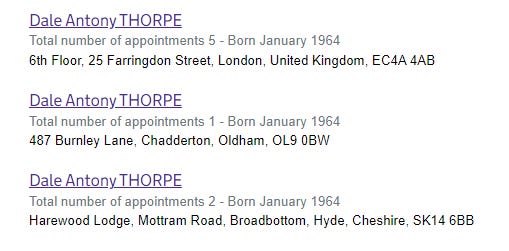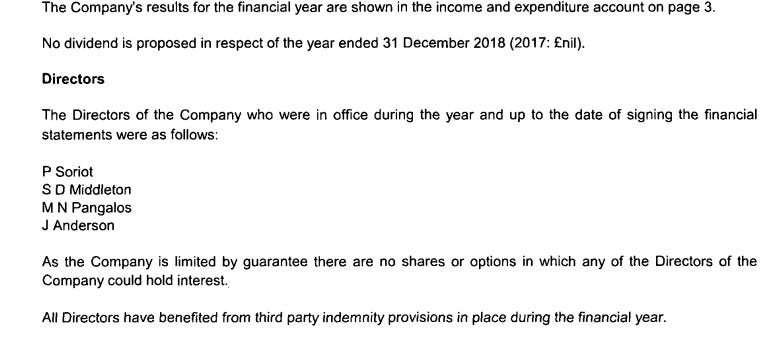Sir Patrick Vallance; 3 identities compromise audits
GSK plc, UK Biobank Limited, British Pharma Group Limited and Genome Research Limited; anomalies in Annual Reports.
A search on the name “Patrick Vallance” returns three identities:
Identity 1:
Patrick John Thompson VALLANCE
Total number of appointments 1
Date of birth March 1960
THE NATURAL HISTORY MUSEUM TRADING COMPANY LIMITED (02909192)
Company status Active Correspondence address Cromwell Road, London, SW7 5BD Role ACTIVE Director Appointed on 21 February 2023
Identity 2:
Patrick John Thompson VALLANCE
Total number of appointments 3
Date of birth March 1960
BRITISH PHARMA GROUP LIMITED (02538510)
Company status Active Correspondence address 980 Great West Road, Brentford, Middlesex, TW8 9GS Role RESIGNED Director Appointed on 1 September 2013 Resigned on 31 March 2018 Nationality British Country of residence United Kingdom Occupation Divisional Director
GSK PLC (03888792)
Company status Active Correspondence address 980 Great West Road, Brentford, Middlesex, TW8 9GS Role RESIGNED Director Appointed on 1 January 2017 Resigned on 31 March 2018 Nationality British Country of residence United Kingdom Occupation Company Director
GENOME RESEARCH LIMITED (02742969)
Company status Active Correspondence address 980 Great West Road, Brentford, Middlesex, United Kingdom, TW78 9GS Role RESIGNED Director Appointed on 26 November 2010 Resigned on 8 December 2017 Nationality British Country of residence United Kingdom Occupation Senior Vice President
Identity 3
Patrick John Thompson VALLANCE
Total number of appointments 1
Date of birth March 1960
UK BIOBANK LIMITED (04978912)
Company status Active Correspondence address Units 1 & 2 Spectrum Way,, (sic) Adswood, Stockport, Cheshire, SK3 0SA Role RESIGNED Director Appointed on 28 June 2013 Resigned on 1 December 2017 Nationality British Country of residence England Occupation President, Pharmaceuticals R&D, Gsk
Opinion
Sir Patrick Vallance has registered three identities in Companies House. Since his name and date of birth are consistent across all three identities, and Companies House assigns a unique identity based on name date of birth and usual residential address, we can conclude that he varied his usual residential address, or used different spelling of the same address. This variation induces a false non-match error in Companies house de-duplication software, and the unwanted outcome, from a legal point of view, is three unique identities for the same individual.
In one identity, identity 3 above, he was a director of UK Biobank Limited, from 28 June 2013 to December 2017. Concurrently, he held directorships of British Pharma Group Limited 1 September, from 2013 to 31 March 2018; GSK plc from 1 January 2017 to 31 March 2018; and, Genome Research Limited from 26 November 2010 to 8 December 2017.
The auditors of British Pharma Group Limited, GSK plc, and Genome Research Limited were expected to consider all three directorships of Sir Patrick Vallance when evaluating related party transactions, given that they share a common identity. However, it's crucial to note that because UK Biobank Limited was held in a distinct and separate identity, it might not have been comprehensively regarded as a related party in the audit process.
Tests for full disclosure of interests
The accounts for each of Sir Patrick Vallance’s interests will be reviewed to test whether his interests are correctly disclosed there.
UK Biobank Limited
The accounts for UK Biobank Limited for the period when Sir Patrick Vallance was a director, were located in the filing history at Companies House (UK BIOBANK LIMITED filing history).
The Group of companies' accounts made up to 30 September 2013 were filed on 25 Mar 2014. Sir Patrick Vallance, who was appointed director on 28 June 2013 is omitted from the list of officers for the company.
The omission of Sir Patrick Vallance from the 2013 accounts as a director, is a material misstatement effecting the integrity of the accounts. He fails to disclose his interest in British Pharma Group Limited in UK Biobank Limited 2013 accounts.
The 2013 audit report has the name of the auditor typed, but it has not been signed with the name of the auditor. This is a breach of section 503 Signature of auditor’s report of the Companies Act 2006.
The auditor Dale Thorpe was tested, by searching for duplicate identities in Companies House (Dale Thorpe - Find). Three identities are returned for Dale Antony Thorpe, with date of birth January 1964 (see below). Within these his occupation is given as accountant. On balance of probability Dale Thorpe has three unique identities registered and is participating in synthetic identity fraud, with a criminal group who have been taking advantage of a weakness in Companies House to create multiple synthetic identities to conceal interests that present a conflict with governance protocols.
The Group of companies' accounts made up to 30 September 2014, filed on 20 Feb 2015, do include Dr Patrick Vallance, as he was then known, in the legal information. However, the directors’ other interests are not disclosed in the annual report. Whereas there is a duty to make all the interests the directors hold explicit to meet transparency and accountability requirements. This is a material omission that brings the financial accuracy of the accounts into question.
The omission of full disclosure of interests by each director in the annual report, is repeated across the accounts for the years that Sir Patrick Vallance was a director. This means that the annual accounts for UK Biobank Limited are potentially compromised for the period studied (Annual reports 2013-2018).
GSK plc
Patrick Vallance was a director of GSK PLC, appointed on 1 January 2017, resigned on 31 March 2018. Is his directorship of British Pharma Group Limited 1 September, from 2013 to 31 March 2018; UK Biobank Limited, from 28 June 2013 to 1 December 2017 ; and, Genome Research Limited from 26 November 2010 to 8 December 2017 disclosed in the GSK Annual Report? The accounts for year ending 31 December 2017 and 2018 were accessed in the filing history (GSK PLC filing history.
In GSK plc’s Group of companies' accounts made up to 31 December 2017, filed 20 Apr 2018, Patrick Vallance is listed as a director, on page 84.
2017 Findings
The 2017 annual report ambiguously states that Dr Patrick Vallance “was previously a Non-executive director of UK Biobank Limited and Genome Research Limited”, not making it clear that he was active in these roles for most of the accounting period, until 1 December 2017 and 8 December 2017 respectively.
The GSK plc 2017 annual report fails to disclose that Dr Patrick Vallance was a director of British Pharma Group Limited from 1 September 2013. This is a material omission that calls into question the integrity of these financial statements.
2018 Findings
In GSK’s annual report for the year ending 31 December 2018, the directors’ interests are disclosed on page 73. A biographical disclosure for Sir Patrick Vallance’s is omitted, even though he was a director of GSK plc up to 31 March 2018 and was concurrently director of British Pharma Group Limited, up to the same date. Sir Patrick Vallance’s interest in British Pharma Group Limited was not declared. This is a material omission that calls into question the integrity of the GSK financial statements for 2018.
British Pharma Group Limited.
Sir Patrick Vallance resigned from the British Pharma Group Limited on 31 March 2018. His directorship for the period 1 January to 31 March 2018 is omitted from the 2018 financial statements. This is a material misstatement which brings into question the integrity of the financial statements.
Genome Research Limited
The accounts for the period that Sir Patrick Vallance was an active director, is disclosed correctly in the accounts that were checked, 2010 and 2018. There is no disclosure of interests by any of the board members in the accounts reviewed. This is a material breech of principals of transparency and accountability. I note that the 2010 accounts of Genome Research Limited were not signed by the auditor (see below). This is a material breach by the directors that were then active. Testing for additional identities for Clare Thompson was not attempted because this is a common name in Companies House and there are too many records to search.
This has been a brief oversight of a sample of the accounts of Sir Patrick Vallance’s interests and in all cases anomalies have been found.
The anomalies identified from the evidence presented in the document are significant and span across multiple entities associated with Sir Patrick Vallance. Firstly, the use of three identities by Sir Patrick Vallance, possibly through variations in his usual residential address, raises concerns about the reliability of Companies House de-duplication software, resulting in three unique identities for the same individual. In terms of full disclosure of interests, there are glaring omissions and material misstatements in the accounts of UK Biobank Limited, GSK plc, British Pharma Group Limited, and Genome Research Limited. Notably, Sir Patrick Vallance's directorships and concurrent interests are either ambiguously stated or entirely omitted in annual reports, leading to potential breaches of transparency and accountability requirements. Furthermore, the omission of signatures in audit reports and the potential involvement of Dale Thorpe in synthetic identity fraud amplify the complexities and risks associated with these entities' financial records. The analysis highlights systemic issues compromising financial accuracy, accountability, and compliance with regulatory frameworks, demanding urgent attention and rectification.
Conclusions:
Impaired Financial Accuracy: Omitting Sir Patrick Vallance as a director in the 2013 accounts for UK Biobank Limited represents a material misstatement, undermining the accuracy of financial records and raising questions about transparency during this period.
Pattern of Non-Disclosure: The consistent non-disclosure of directors' interests, notably by Sir Patrick Vallance, across multiple annual reports indicates a systemic failure to meet transparency and accountability requirements, compromising the reliability of financial disclosures.
Compromised Accountability: The absence of full disclosure of directors' interests, despite a legal duty to do so, compromises the accountability framework, denying stakeholders crucial information for assessing potential conflicts of interest and ensuring robust corporate governance.
Potentially Misleading Shareholders: Failure to disclose all relevant interests in annual reports, especially during Vallance's directorship, raises concerns about the accuracy of information provided to shareholders, potentially leading to misinformation.
Systemic Impact on UK Genomics Limited: The consistent pattern of non-disclosure across annual accounts for UK Genomics Limited suggests a systemic issue, impacting the overall financial credibility of the company during the studied period (2013-2018).
Regulatory Compliance Concerns: Inconsistencies in disclosing directors' interests may raise regulatory compliance concerns, jeopardising the reputation of the companies involved and exposing them to potential regulatory scrutiny.
Risks Associated with Identity Fraud:
Pervasive Conflicts of Interest: Concurrent directorships in various entities magnify the potential for conflicts of interest, raising ethical questions regarding impartiality and fair representation.
Influence on Contractual Agreements: Vallance's multi-faceted role raises concerns about influencing contractual decisions, potentially leading to agreements that disproportionately benefit specific entities.
Opacity in Decision-Making: Deliberate use of multiple identities creates opacity, hindering stakeholders, regulatory bodies, and auditors from understanding Vallance's multifaceted influence.
Insider Information Vulnerabilities: Simultaneous involvement in diverse sectors opens avenues for accessing insider information, posing risks of unethical use and complicating the maintenance of confidentiality.
Auditing Complexities: The fragmented nature of identities introduces complexities in auditing, making it challenging to piece together a comprehensive assessment of related party transactions.
Reputational Quagmire: Disclosure of such practices places Vallance and involved organisations at risk of reputational damage, impacting stakeholder trust in the leadership's commitment to ethical conduct.
Potential Legal Ramifications: The intricate interplay of identities and concurrent directorships may attract legal scrutiny, with regulatory bodies investigating compliance with established legal and ethical standards.
In conclusion, the review of Sir Patrick Vallance's directorships and the associated anomalies in the annual reports reveal a troubling pattern of non-disclosure, material misstatements, and potential breaches of regulatory and ethical standards. The identified issues, spanning from impaired financial accuracy to risks associated with identity manipulation, collectively point to systemic failures in transparency, accountability, and adherence to governance protocols within the studied companies.
These findings raise significant concerns about the reliability of financial disclosures, the adequacy of corporate governance practices, and the potential exposure to legal and regulatory repercussions. Urgent attention is warranted to rectify these lapses and bolster governance frameworks. The observed risks associated with identity fraud not only highlight vulnerabilities in current practices but also emphasise the need for robust regulatory mechanisms to safeguard the integrity of leadership structures in both public and private spheres.
Addressing these issues is paramount not only for the companies involved but also for maintaining stakeholder trust, ensuring accurate and transparent financial reporting, and upholding the ethical fabric that underpins leadership roles. As the findings suggest a systemic impact on financial credibility and potential legal ramifications, prompt corrective actions are crucial to restore confidence and uphold the highest standards of corporate conduct.
Note: It's essential to acknowledge that the scrutiny conducted on the accounts of Sir Patrick Vallance's directorships, notably in UK Biobank Limited, GSK plc, British Pharma Group Limited, and Genome Research Limited, was not exhaustive. The limited scope of this examination does not replace a systematic and in-depth forensic audit, which is imperative for a comprehensive understanding of potential irregularities. A thorough forensic audit, conducted by specialists, is recommended to ensure a meticulous and comprehensive review of all relevant financial records and disclosures.










A meeting was arranged in 2020 with vallance ,Jeremy farrar (welcome trust) and Tony fauci!! amongst others.
The notes of the meeting were requested in a FOI request which was successful but all 28 pages were blacked out apart form names and dates.
I'm sure it's all above board.
👍🤝
I am impressed with your mole-like searching out of details like this. Perhaps compliance at Companies House is only for the Little People.